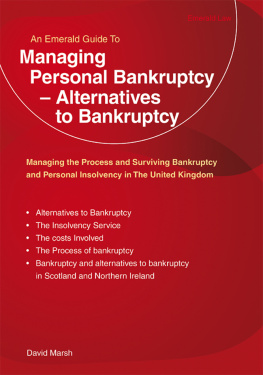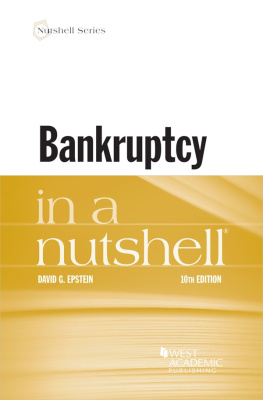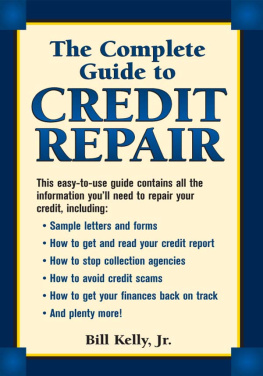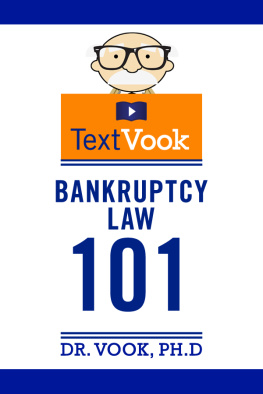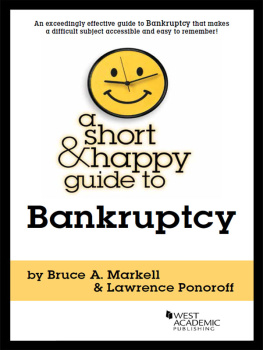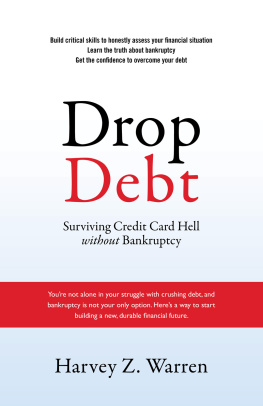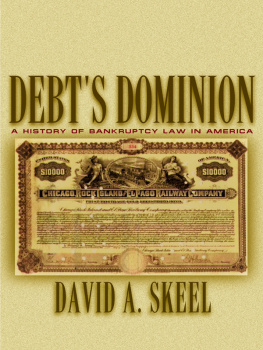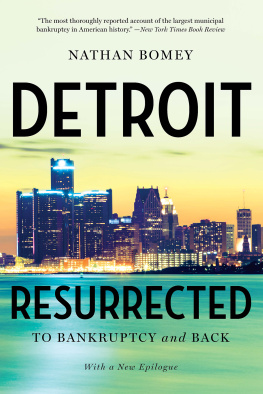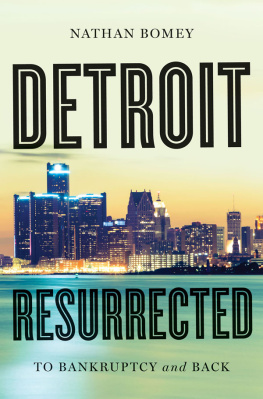MANAGING PERSONAL
BANKRUPTCY
AND ALTERNATIVES TO BANKRUPTCY IN
THE UNITED KINGDOM
DAVID MARSH
Emerald Guides
Emerald Guides
Straightforward Publishing 2016
All rights reserved. No part of this publication may be reproduced in a retrieval system or transmitted by any means, electronic or mechanical, photocopying or otherwise, without the prior permission of the copyright holders.
ISBN 978-1-84716-655-5
eISBN 978-1-84716-690-6
Kindle ISBN 978-1-84716-691-3
Printed by 4edge www.4edge.co.uk
Cover design by Bookworks Islington
Whilst every effort has been made to ensure that the information contained within this book is correct at the time of going to press, the author and publisher can take no responsibility for the errors or omissions contained within.
Contents
***************
Introduction
This book deals firstly with alternatives to bankruptcy and also personal bankruptcies in England and Wales-recognising that bankruptcy is the last and final option to solving debt problems. Bankruptcy and alternatives to bankruptcy in Scotland and Northern Ireland are also discussed.
Over the last ten years, personal bankruptcies in the UK have risen to record levels, in large part to do with the economic climate, i.e. recession and also the steady rise in personal debt, fuelled by an economic boom that ended, as they all do, in tears. Although at the time of writing, we have climbed out of recession, growth is slow and companies are still entering administration and individuals facing difficulties. It is not clear how the decision to leave the European Union will affect the future.
It was predicted that in 2015/16 around 150,000 individuals would go bankrupt. However, more people are opting for alternatives to bankruptcy and are going for IVAs (Individual Voluntary Arrangements, see ). In addition, pensioners, once a negligible part of the whole picture, are increasingly having to seek relief from debt.
In part one, the book offers a step-by-step guide to personal bankruptcy and also alternatives to bankruptcy such as Debt Management Plans, Individual Voluntary Arrangements, Administration Orders and Debt Relief Orders. The second part deals with actual bankruptcy and the process of bankruptcy. Part 2 also deals with Bankruptcy and alternatives to bankruptcy in Scotland and Northern Ireland, which are slightly different to England and Wales.
The nature and type of advice available to people who are considering bankruptcy is covered. How to deal with creditors and also institutions such as banks is also covered along with the process of bankruptcy, costs, the hearing and the bankruptcy petition plus the interview with the Official Receiver.
Following the process of bankruptcy, the duties and restrictions imposed upon an individual are covered along with the eventual discharge from bankruptcy. The nature of debts included in the bankruptcy process are covered along with the treatment of assets.
Overall, this is a very practical book, complete with key forms used in the bankruptcy process. Any individual who is contemplating bankruptcy will benefit directly from the practical advice contained within.
***************
Part 1.
PERSONNEL INVOLVED IN BANKRUPTCY- ENGLAND AND WALES
Chapter 1
The Personnel Involved in Bankruptcy-England and Wales
The Insolvency Service
The Insolvency Service, which is an executive agency of the Department of Business, Innovation and Skills, operates under a statutory framework-mainly the Insolvency Acts 1986 and 2000, Amended by the Enterprise Act 2002, the Company Directors Disqualifications Act 1986 and the Employment Rights Act 1996. There are a network of 21 Official Receiver offices throughout England and Wales with 1,700 staff. The Enforcement Directorate and headquarters are in London, Birmingham, Manchester and Edinburgh.
What the Insolvency Service does
The Insolvency Service:
administers and investigates the affairs of bankrupts, of companies and partnerships wound up by the court, and establishes why they became solvent;
acts as trustee/liquidator where no private sector insolvency practitioner is appointed;
acts as nominee and supervisor in fast-track individual voluntary arrangements;
takes forward reports of bankrupts and directors misconduct;
deals with the disqualification of unfit directors in all corporate failures;
deals with bankruptcy restriction orders and undertakings; authorises and regulates the insolvency profession;
assesses and pays statutory entitlement to redundancy payments when an employer cannot or will not pay its employees;
provides banking and investment services for bankruptcy and liquidation estate funds;
advises BIS ministers and other government departments and agencies on insolvency, redundancy and related issues;
provides information to the public on insolvency and
redundancy matters via its website, https://www.gov.uk/government/organisations/insolvency-service
The Insolvency Service also carries out investigations into companies. If you are thinking about going bankrupt you should contact the Insolvency Service via their website or the national helpline on 0300 678 0015. Alternatively you can go to the Citizens Advice website citizensadvice.org.uk, full address contained in the back of this book. The National Debtline also provides useful information nationaldebtline.org.uk 0808 808 4000.
The Official Receiver
The Official Receiver is a civil servant in the Insolvency Service and an Officer of the Court. He or she will be notified by the court of the bankruptcy or winding up order. He/she will then be responsible through their staff for administering the initial stage, at least, of the insolvency case. This stage includes collecting and protecting any assets and investigating the causes of the bankruptcy or winding up.
The Official Receivers staff will contact you, either immediately if action is urgently needed or within 2 days of receiving an insolvency order or bankruptcy order. Usually they will arrange an appointment for you to attend the Official Receivers office for an interview, normally within ten working days of receiving the order from the court. He or she will then act as your trustee in bankruptcy unless the court appoints an insolvency practitioner to take this role. Assuming that it is the Official Receiver who will be acting as your trustee, he or she will be responsible for looking after your financial affairs during your bankruptcy and also your financial affairs prior to you being made bankrupt.
If the Official Receiver does not require you to attend an interview you will be sent a questionnaire to fill in and return. See for the detailed process of bankruptcy and the steps involved.
In the following we will look at the alternatives to bankruptcy in England and Wales. The alternatives are Debt Management Plans, Individual Voluntary Arrangements, Administration Orders and Debt Relief Orders.
***************
Chapter 2
Alternatives to Bankruptcy -England and Wales
1. Debt Management Plans
A Debt Management Plan is a way of planning your debt payments over a number of years. It has similarities to an Individual Voluntary Arrangement in that it is a way of organising and paying off debt and keeping creditors at bay.
There are two types of Debt Management Plan:
1. The type where you are provided with standard letters and you are in charge of making payments. With this method you are in charge of dealing with your creditors.
2. The type where a third party contacts all your creditors. Using this method, your financial situation is illustrated by a set of papers called a common financial statement. You will be represented by a third party and given 24hr support.

